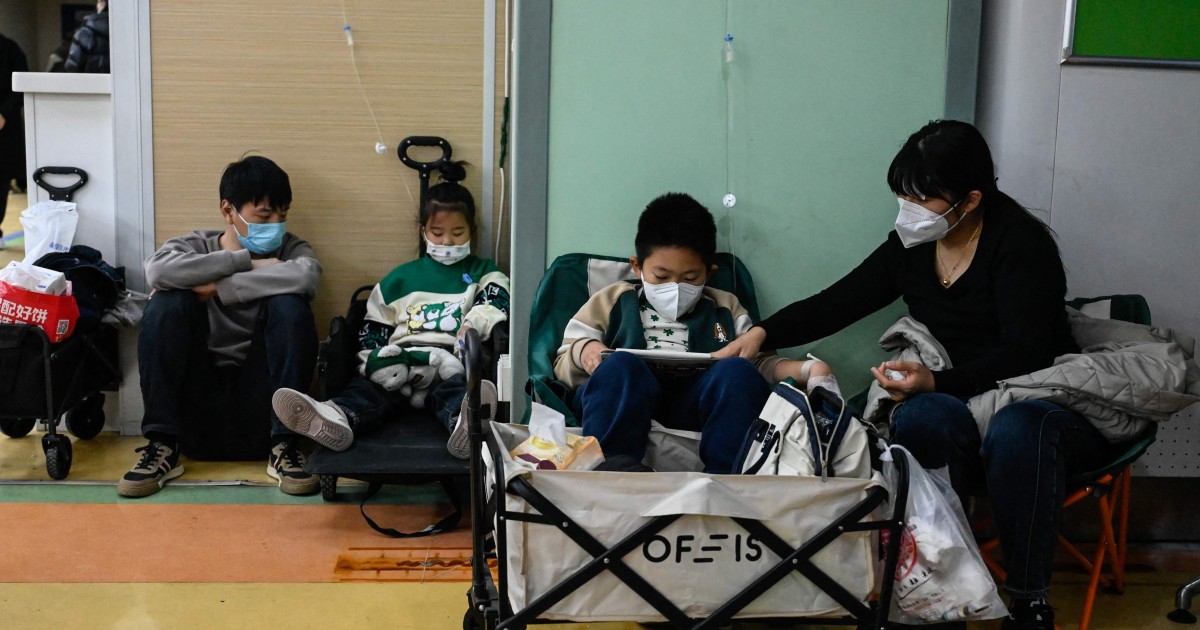Chinese hospitals ‘overwhelmed with sick children’ after surge in respiratory illness
China has reported an increase in respiratory illnesses as it enters its first full flu season. The WHO says the spike is caused by known pathogens, and does not pose a global threat.
HONG KONG — Hospitals in northern China appear to be “overwhelmed with sick children” as the country grapples with a surge in respiratory illnesses and clusters of pneumonia, prompting the World Health Organization to ask Beijing for more data.
At the Beijing Children’s Hospital in the capital, long lines of people were waiting to register during a visit by NBC News on Thursday. Waiting rooms were crowded with parents and children, some of them on IV drips.
In a review of China's data, the World Health Organization said that the increase in cases came earlier in the season, “but not unexpected given the lifting of COVID-19 restrictions, as similarly experienced in other countries.”
According to WHO, Chinese health authorities did not detect new or unusual pathogens, and that the rise in respiratory illnesses has not resulted in patient loads that exceeded hospital capacities.
There was no indication that the outbreak in China poses any global threat, and the WHO advised against any travel restrictions "based on the current information available on this event."
Since mid-October, the WHO said, northern China has reported an increase in respiratory diseases compared with the same period in the previous three years. The increase coincides with the end of China’s National Day holiday week, one of its busiest travel periods.
This is also China’s first full flu season since the lifting late last year of some of the world’s most stringent Covid-19 restrictions, which minimized many people’s exposure to a wide range of pathogens for three years.
Countries such as Australia and New Zealand that also had “zero-Covid” restrictions experienced similar surges in respiratory diseases when they were lifted, and the United States had its own “tripledemic” of respiratory viruses last year.
Something similar is most likely happening in China, said Jin Dong-yan, a virologist at the University of Hong Kong.
“We don’t think there is a major issue there or there is some unknown disease or something that is hidden,” he told NBC News in a phone interview Thursday. “We have no evidence for that.”
“I know four or five families with this situation,” Emma Wang, 39, who's 7-year-old daughter caught mycoplasma pneumonia, said. "I am very worried the virus will keep spreading."
"As a parent, I hope the relevant government department can inform us about treatment plans and course of the disease, what steps to take and how long before it can be cured," Wang said.
The WHO said Wednesday that it had asked China to provide detailed information on an increase in respiratory illnesses and reported clusters of pneumonia in children.
That followed an alert on Tuesday by ProMED, a publicly available reporting system for emerging diseases and outbreaks, saying that hospitals in Beijing and elsewhere in China were “overwhelmed with sick children” amid outbreaks of pneumonia.
Both China and the WHO have been criticized over their transparency in reporting the initial cases of Covid-19, which was first detected in the central Chinese city of Wuhan in late 2019.
Chinese health officials said last week that the country was experiencing a seasonal increase in overlapping respiratory diseases, including influenza, respiratory syncytial virus (RSV) and the virus that causes Covid-19, attributing it in part to the lifting of Covid-19 restrictions.
They said there had also been a surge in cases of mycoplasma pneumonia, a common bacterial infection that usually affects young children and is also known as “walking pneumonia” because it rarely requires hospitalization.
China has reported an increase in respiratory illnesses as it enters its first full flu season since lifting Covid restrictions. The WHO says the spike is caused by known pathogens, and does not pose a global threat.

www.nbcnews.com
